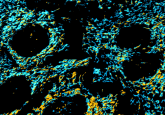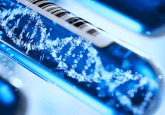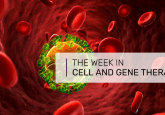Cell therapy weekly: promising Phase 1 clinical trial results for a potential HIV cure

This week: PBS Biotech receives US$22 million investment to expand their product portfolio, FUJIFILM Irvine Scientific launches BalanCD HEK293 Viral Feed and AGT103-T shows promising results in its first-in-human trial, which could lead to a potential cure for HIV.
The news highlights:
- PBS Biotech receives $22 million to expand its product portfolio
- FUJIFILM Irvine Scientific launches HEK293 feed for viral vector production
- Promising Phase 1 clinical trial results of AGT103-T, a potential HIV cure
PBS Biotech receives $22 million to expand its product portfolio
PBS Biotech (CA, USA) has received US$22 million of funding from Avego Management, LLC (GA, USA) and BroadOak Capital Partners (MD, USA), who is an existing investor of the bioreactor manufacturer. One of their products is the PBS Vertical-Wheel® bioreactor, which provides scalable fluid mixing conditions that are ideal for human cell-derived modalities, especially iPSCs, MSCs, and exosome-based therapeutics manufacturing. The funds will be used to expand PBS Biotech’s product portfolio, expand the capabilities of its process development services, and increase the customer support available for its global cell therapy clients.
Brian Lee, CEO of PBS Biotech, stated: “The investment from Avego Management and BroadOak ensures PBS Biotech will continue to provide the best manufacturing platform along with unsurpassed technical support to unlock clinical and commercial manufacturing of allogeneic cell-based therapies for decades to come.”
FUJIFILM Irvine Scientific launches HEK293 feed for viral vector production
FUJIFILM Irvine Scientific Inc. (CA, USA) has announced the launch of its new feed medium, BalanCD HEK293 Viral Feed, which is designed to improve adeno-associated viral vector (AAV) production for applications in gene therapy and viral vector-based vaccines. This is a chemically defined, nutrient-based HEK293-specific feed medium.
As more gene therapies gain approval from the FDA and as commercial demand for viral vector-based vaccines and gene therapies increases, there is a greater need for large-scale and efficient viral vector manufacturing. BalanCD HEK293 Viral feed is optimized to deliver high titers and improves viral packaging efficiency by up to 67%, compared to basal control without viral-specific feed, thereby enhancing production efficiency. This cell culture media increases viral vector production of HEK293 cells that are grown in suspension and at scale and has been formulated to deliver consistent performance.
Erik Vaessen, the chief business officer of FUJIFILM Irvine Scientific, commented: “Viral vector manufacturing must evolve rapidly to support increased numbers of gene therapies and viral vector-based vaccines being developed and commercialized. We developed BalanCD HEK293 Viral Feed specifically to increase yields and help manufacturers maximize production, and lower cost of goods related to viral vector-based drug programs.”
Promising Phase 1 clinical trial results of AGT103-T, a potential HIV cure
American Gene Technologies® (MD, USA), a clinical-stage biotechnology company, has reported data from the first in-human study of AGT103-T autologous T-cell therapy, which shows promise as a potential cure for HIV. The collected data meets the primary and secondary endpoints of their AGT103-T Phase 1 clinical trial, the data from which has been published in Frontiers. The researchers expect to submit their final Phase 1 trial report to the FDA in 2023 and American Gene Technologies is currently writing the protocol for a Phase 2 trial to continue clinical development.
“Our primary goal concerned safety of the cell product in low and high doses,” explained Jeff Galvin, CEO and founder of American Gene Technologies. “Our secondary objective included measuring responses to treatment, persistence of AGT103-T in vivo, responses to HIV peptide stimulation, and ability to coordinate a killer T-cell response to HIV upon stimulation.”
AGT103-T is a T cell product made from an individual’s own cells and modified with the AGT103 lentiviral vector for HIV resistance. These modifications enhance the T cells’ RNA interference capabilities against HIV. These T cells also lack the CCR5 co-receptor that HIV relies on to enter helper T cells. The Phase 1 trial found that AGT103-T was well-tolerated in humans and persisted in the body. When stimulated, the T cells were able to respond to target HIV peptides.
The modified T cells were infused into trial participants with no serious adverse events at low or high doses. Continued monitoring of participants also showed no serious adverse events. Blood data was collected, revealing that the modified T cells engrafted back into the body along with killer T cells.



